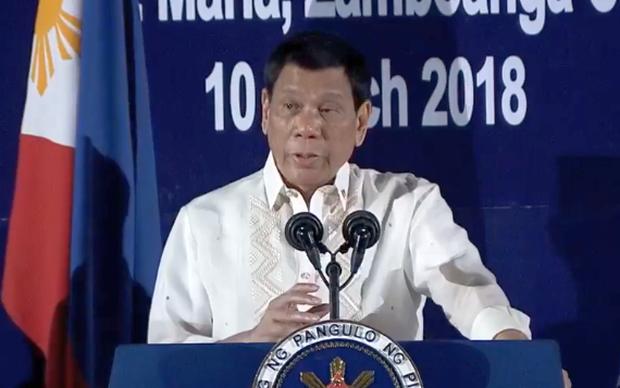PH withdrawing from ICC – Duterte

President Rodrigo Duterte talks to troops at the Edward Andrews Air Base in Zamboanga City on Saturday, March 10, 2018. (Photo from an RTVM video)
President Rodrigo Duterte on Wednesday said he would withdraw the Philippines’ ratification of the Rome Statute, the treaty that established the International Criminal Court (ICC), due to “baseless” accusations against him by UN officials and violations of due process by the ICC.
The President’s announcement came a month after ICC Prosecutor Fatou Bensouda said she would start a preliminary examination of a complaint accusing Mr. Duterte of crimes against humanity in connection with his bloody war on drugs.
In a statement, Mr. Duterte declared “that the Philippines is withdrawing its ratification of the Rome Statute effective immediately.”
He directed Executive Secretary Salvador Medialdea to give notice of the Philippines’ withdrawal, according to presidential spokesperson Harry Roque.
“The accusations of these United Nations officials have the effect of painting me guilty before the eyes of the world. There appears to be a concerted effort on those aforesaid United Nations officials to paint me as a ruthless and heartless violator of human rights,” the President said, referring specifically to the special rapporteur on extrajudicial killings, Agnes Callamard, and UN human rights chief Zeid Ra’ad al-Hussein.
Article continues after this advertisementThe ICC attempt to acquire jurisdiction over him, he said, violated his rights to due process and presumption of innocence.
Article continues after this advertisementTechnicality
Citing a technicality, Mr. Duterte said the Rome Statute could not be enforced in the Philippines because it was not published in the Official Gazette.
But human rights advocates, the President’s critics and the political opposition said withdrawing from the Rome Statute would not save him from the charges.
“If Duterte thinks he can get away from the ICC complaint because of this withdrawal from the Rome Statute, he could not be more wrong,” Magdalo Rep. Gary Alejano said in a statement.
“It will not erase his crimes. It will only highlight his guilt,” Alejano said.
Accountability
Bayan Muna Rep. Carlos Isagani Zarate said the withdrawal from the treaty was “intended to escape accountability by present and even future officials for crimes committed against the people and humanity.”
“For all the bluster of the present administration in the manner it launched its bloody wars, this withdrawal also means that it is gravely petrified of the long arm of the law and accountability,” Zarate said.
In his statement, Mr. Duterte said Callamard and Zeid, who said last week that the President may need to see a psychiatrist, “readily show international bias and refusal of some sectors of the international community to support the Philippines’ legitimate efforts at self-determination, nation building and independence from foreign influence and control.”
“Coupled with the implication of culpability that the preliminary examination by Prosecutor Fatou Bensouda unduly and maliciously created, it is apparent that the ICC is being utilized as a political tool against the Philippines,” he added.
Ifugao Rep. Teddy Baguilat Jr. said the President’s move was “unprecedented but obviously ill-advised.”
“Since this administration is so convinced that its drug war is justified and that there are no human rights violations then it should have nothing to fear about being investigated by the ICC,” he added.
Senate ratification
The Senate ratified the Rome Stature in 2011 under President Benigno Aquino III.
Senate Minority Leader Franklin Drilon said under Article 127 of the Rome Statute, “the withdrawal has no effect on the cases which were filed before the withdrawal.”
“I’m sure the government will assert that it is no longer bound by the statute. That is a legal issue [that] will now be resolved by the court,” Drilon told reporters.
Sen. Antonio Trillanes IV, one of Mr. Duterte’s fiercest critics, said the President made a political move “because he knows that there is no way out for him in the ICC.”
“He cannot scare them the way he could do so with our courts,” Trillanes said in a statement.
Human rights
The national president of the Integrated Bar of the Philippines, Abdiel Dan Fajardo, said such an important national decision “should undergo the same scrutiny, diligent study and debate that the country’s prior decision of entering into the Rome Statute went through.”
The President’s decision was “a significant setback to the decadeslong global effort of universal jurisdiction to ensure accountability for the most serious violations of human rights law,” according to Commission on Human Rights Chair Chito Gascon.
The New York-based Human Rights Watch said Mr. Duterte’s withdrawal from the treaty “doesn’t shut the door on the prosecutor’s scrutiny of the government’s horrendous track record of grave abuses.”
The National Union of Peoples’ Lawyers (NUPL) called Duterte’s move a “cop-out.”
“He wants to be immune and act with impunity both under domestic law and under international law,” said NUPL president Edre Olalia. —Reports from Leila B. Salaverria, Nikko Dizon, Dj Yap, Vince F. Nonato, Christine O. AvendaÑO, Jaymee T. Gamil, Marlon Ramos and the wires